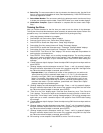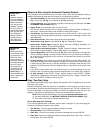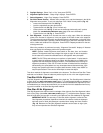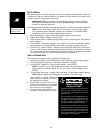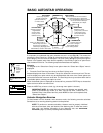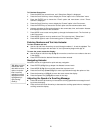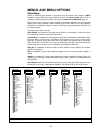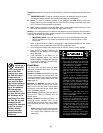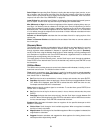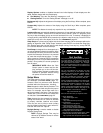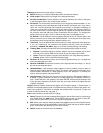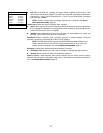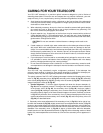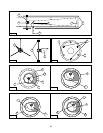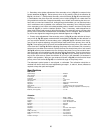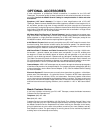
24
Solar Eclipse lists upcoming Solar Eclipses, including the date and type (total, annular, or par-
tial) of eclipse, and the location and time of the first and last contacts of the Moon's shadow.
Use the Scroll Up and Down keys to display the available data. Remember, never use a tele-
scope to look at the Sun! See “WARNING!” on page 23.
Lunar Eclipse lists upcoming Lunar Eclipses, including the date and type (total, partial, penum-
bral) of eclipse. Use the Scroll Up and Down keys to display the available data.
Min. (Minimum) of Algol is the minimum brightness of the dramatic eclipsing binary star sys-
tem, Algol. It is relatively close at a distance of 100 light years. Every 2.8 days during a 10-hour
period, Algol undergoes a major change in apparent magnitude as one of the two stars passes
behind the other. The combined magnitude of the two stars thus dips from +2.1 to a minimum
of +3.4 halfway through the eclipse as the second star is hidden. Autostar calculates minimum
magnitude time at mid-eclipse.
Autumn and Vernal Equinox calculates the time and date of the fall or spring equinox of the
current year.
Winter and Summer Solstice calculates the time and date of the winter or summer solstice of
the current year.
Glossary Menu
The Glossary menu provides an alphabetical listing of definitions and descriptions for common
astronomical terms and Autostar functions. Access directly through the Glossary menu or
through hypertext words embedded in Autostar. A hypertext word is any word in [brackets],
usually found when using the Autostar Help function or when reading a scrolling message such
as a description of a planet or star. Press ENTER whenever a hypertext word is on screen and
Autostar goes to the glossary entry for that word.
To access directly from the Glossary menu, use the Scroll keys to scroll through the alphabet.
Press ENTER on the desired letter. Scroll to the desired entry and then press ENTER to read
the description.
Utilities Menu
The Utilities menu provides access to several extra features within Autostar, including a count-
down timer and an alarm. The Utilities functions include:
Timer selects a countdown timer. This feature is useful for functions such as astrophotography
and tracking satellites. See
OBSERVING SATELLITES, page 34. To use the Timer, press ENTER,
then choose “Set” or “Start/Stop."
■
Set: Enter the time to be counted down, in hours, minutes, and seconds, then press ENTER.
■ Start/Stop: Activates the timer set previously. Use the Scroll keys to toggle between ON and
OFF. When ON is displayed, press ENTER to activate the timer. When the timer runs out,
four beeps sound and the timer is deactivated.
Alarm selects a time for an alarm signal as a reminder. To use the Alarm, press ENTER, then
choose "Set" or "Start/Stop."
■
Set: Enter the time of day for the alarm to sound, in hours, minutes, and seconds, then press
ENTER.
■ Start/Stop: Activates the alarm set previously. Use the Scroll keys to toggle between ON
and OFF. When ON is displayed, press ENTER to activate the alarm. When the alarm time
arrives, Autostar beeps. Press ENTER to deactivate the alarm.
Eyepiece Calc calculates information about an eyepiece for the specific telescope to which
Autostar is connected.
■ Field of View: Scroll through a list of available eyepieces. When an eyepiece is selected,
the field of view is calculated.
■ Magnification: Scroll through a list of available eyepieces. When an eyepiece is selected, the
magnification is calculated.
■ Suggest: Autostar calculates and suggests the best eyepiece for viewing, based on the
telescope and the object being viewed.



